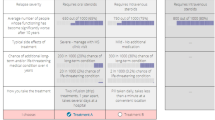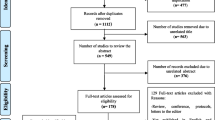Abstract
Background
Risk attitude is defined as the willingness to tolerate risk to achieve a greater expected return. Limited information is available on how relapsing–remitting multiple sclerosis people’s perceptions about disease trajectory and risk attitude may influence treatment choices.
Methods
A non-interventional study applying principles of behavioral economics was conducted to assess willingness to receive unwarranted high-efficacy disease-modifying therapy (DMT) according to best-practice guidelines. People with relapsing–remitting multiple sclerosis (PwRRMS) according to 2010 McDonald criteria completed a survey on symptom severity, risk preferences, and management of simulated case scenarios mimicking the current treatment landscape. PwRRMS’s choice for high-efficacy agents was established as the participant’s selection of monoclonal antibodies for case scenarios with at least 2 years of clinical and radiological stability.
Results
A total of 211 PwRRMS were studied (mean age 39.1 ± 9.5 years, 70.1% female, mean Expanded Disability Status Scale score 1.8 ± 1.1). Almost 50% (n = 96) opted for a high-efficacy DMT despite the lack of evidence of disease activity. Younger age and risk-seeking behavior were associated with an increased likelihood of selecting unwarranted high-efficacy DMT [odds ratio (OR) 2.00, 95% confidence interval (CI) 1.02–3.93, p = 0.043, and OR 2.17, 95% CI 1.09–4.30, p = 0.027, respectively]. Clinical characteristics or subjective perception of symptom severity had no influence on participants’ treatment choices.
Conclusion
Identifying PwRRMS with risk-seeking behavior would be crucial to implementing specific educational strategies to manage information on disease prognosis, treatment expectations, and safety risk knowledge.

Similar content being viewed by others
References
Dobson R, Giovannoni G. Multiple sclerosis—a review. Eur J Neurol. 2019;26(1):27–40.
Timmermans ST, de Groot V, Beckerman H. Ten-year disease progression in multiple sclerosis: walking declines more rapidly than arm and hand function. Mult Scler Relat Disord. 2020;45:102343.
García-Domínguez JM, Maurino J, Martínez-Ginés ML, et al. Economic burden of multiple sclerosis in a population with low physical disability. BMC Public Health. 2019;19(1):609.
Li H, Hu F, Zhang Y, Li K. Comparative efficacy and acceptability of disease-modifying therapies in patients with relapsing-remitting multiple sclerosis: a systematic review and network meta-analysis. J Neurol. 2019. https://doi.org/10.1007/s00415-019-09395-w(Online ahead of print).
Stankiewicz JM, Weiner HL. An argument for broad use of high efficacy treatments in early multiple sclerosis. Neurol Neuroimmunol Neuroinflamm. 2019;7:e636.
Lucchetta RC, Leonart LP, Becker J, Pontarolo R, Fernandez-Llimós F, Wiens A. Safety outcomes of disease-modifying therapies for relapsing-remitting multiple sclerosis: a network meta-analysis. Mult Scler Relat Disord. 2019;35:7–15.
Heesen C, Rahn AC. Shared decision making in managing multiple sclerosis: revisiting the research agenda. Int J MS Care. 2018;20(6):v–vi.
Eskyte I, Manzano A, Pepper G, Pavitt S, Ford H, Bekker H, Chataway J, Schmierer K, Meads D, Webb E, Potrata B. Understanding treatment decisions from the perspective of people with relapsing remitting multiple sclerosis: a critical interpretive synthesis. Mult Scler Relat Disord. 2019;27:370–7.
Desborough J, Brunoro C, Parkinson A, et al. ‘It struck at the heart of who I thought I was’: a meta-synthesis of the qualitative literature examining the experiences of people with multiple sclerosis. Health Expect. 2020. https://doi.org/10.1111/hex.13093.
Rice T. The behavioral economics of health and health care. Annu Rev Public Health. 2013;34:431–47.
Díaz A, Esparcia C. Assessing risk aversion from the investor’s point of view. Front Psychol. 2019;10:1490.
Wilski M, Kocur P, Gorny M, Koper M, Nadolska A, Chmielewski B, Tomczak M. Perceptions of multiple sclerosis impact and treatment efficacy beliefs: mediating effect of patient’s illness and self-appraisals. J Pain Symptom Manag. 2019;58(3):437–44.
Saposnik G, Sotoca J, Sempere AP, et al. Therapeutic status quo in patients with relapsing-remitting multiple sclerosis: a sign of poor self-perception of their clinical status? Mult Scler Relat Disord. 2020;45:102354 (published online ahead of print, 2020 Jul 2).
Saposnik G, Montalban X. Therapeutic inertia in the new landscape of multiple sclerosis care. Front Neurol. 2018;9:174.
Polman CH, Reingold SC, Banwell B, Clanet M, Cohen JA, Filippi M, et al. Diagnostic criteria for multiple sclerosis: 2010 revisions to the McDonald criteria. Ann Neurol. 2011;69(2):292–302.
Kurtzke JF. Rating neurologic impairment in multiple sclerosis: an expanded disability status scale (EDSS). Neurology. 1983;33(11):1444–52.
Christopoulos GI, Tobler PN, Bossaerts P, Dolan RJ, Schultz W. Neural correlates of value, risk, and risk aversion contributing to decision making under risk. J Neurosci. 2009;29(40):12574–83.
Levy I, Snell J, Nelson AJ, Rustichini A, Glimcher PW. Neural representation of subjective value under risk and ambiguity. J Neurophysiol. 2010;103(2):1036–47.
Dohmen T, Falk A, Huffman D, Sunde U, Schupp J, Wagner GG. Individual risk attitudes: measurement, determinants, and behavioral consequences. J Eur Econ Assoc. 2011;9(3):522–50.
Saposnik G, Sempere AP, Roulas R, Prefasi D, Selchen D, Maurino J. Decision making under uncertainty, therapeutic inertia, and physicians’ risk preferences in the management of multiple sclerosis (DIScUTIR MS). BMC Neurol. 2016;16:58.
Green R, Kalina J, Ford R, Pandey K, Kister I. SymptoMScreen: a tool for rapid assessment of symptom severity in MS across multiple domains. Appl Neuropsychol Adult. 2017;24:183–9.
Meca-Lallana J, Maurino J, Hernández-Pérez MA, Sempere AP, Brieva L, García-Arcelay E, Terzaghi M, Saposnik G, Ballesteros J. Psychometric properties of the SymptoMScreen questionnaire in a mild disability population of patients with relapsing-remitting multiple sclerosis: quantifying the patient’s perspective. Neurol Ther. 2020;9:173–9.
Benedict RH, DeLuca J, Phillips G, LaRocca N, Hudson LD, Rudick R. Validity of the Symbol Digit Modalities Test as a cognition performance outcome measure for multiple sclerosis. Mult Scler. 2017;23(5):721–33.
Montalban X, Gold R, Thompson AJ, Otero-Romero S, Amato MP, Chandraratna D, Clanet M, Comi G, Derfuss T, Fazekas F, Hartung HP, Havrdova E, Hemmer B, Kappos L, Liblau R, Lubetzki C, Marcus E, Miller DH, Olsson T, Pilling S, Selmaj K, Siva A, Sorensen PS, Sormani MP, Thalheim C, Wiendl H, Zipp F. ECTRIMS/EAN guideline on the pharmacological treatment of people with multiple sclerosis. Mult Scler. 2018;24(2):96–120.
Saposnik G, Sempere AP, Prefasi D, Selchen D, Ruff CC, Maurino J, Tobler PN. Decision-making in multiple sclerosis: the role of aversion to ambiguity for therapeutic inertia among neurologists (DIScUTIR MS). Front Neurol. 2017;8:65.
Nielsen J, Saliger J, Montag C, Markett S, Nöhring C, Karbe H. Facing the unknown: fear of progression could be a relevant psychological risk factor for depressive mood states among patients with multiple sclerosis. Psychother Psychosom. 2018;87:190–2.
Heesen C, Köpke S, Solari A, Geiger F, Kasper J. Patient autonomy in multiple sclerosis-possible goals and assessment strategies. J Neurol Sci. 2013;331(1–2):2–9.
Pranka M. Biographical disruption and factors facilitating overcoming it. SHS Web Conf. 2018;51:03007.
Tur C, Tintoré M, Vidal-Jordana Á, Bichuetti D, Nieto-González P, Arévalo MJ, Arrambide G, Anglada E, Galán I, Castillo J, Nos C, Rio J, Martín MI, Comabella M, Sastre-Garriga J, Montalban X. Risk acceptance in multiple sclerosis patients on natalizumab treatment. PLoS ONE. 2013;8(12):e82796.
Heesen C, Kleiter I, Meuth SG, Krämer J, Kasper J, Köpke S, Gaissmaier W. Benefit-risk perception of natalizumab therapy in neurologists and a large cohort of multiple sclerosis patients. J Neurol Sci. 2017;376:181–90.
Fox RJ, Salter A, Alster JM, et al. Risk tolerance to MS therapies: survey results from the NARCOMS registry. Mult Scler Relat Disord. 2015;4:241–9.
Fox RJ, Cosenza C, Cripps L, Ford P, Mercer M, Natarajan S, Salter A, Tyry T, Cofield SS. A survey of risk tolerance to multiple sclerosis therapies. Neurology. 2019;92(14):e1634–42.
Mata R, Josef AK, Samanez-Larkin GR, Hertwig R. Age differences in risky choice: a meta-analysis. Ann N Y Acad Sci. 2011;1235:18–29.
Maurino J, Martínez-Ginés ML, García-Domínguez JM, et al. Workplace difficulties, health-related quality of life, and perception of stigma from the perspective of patients with multiple sclerosis. Mult Scler Relat Disord. 2020;41:102046.
Webb EJD, Meads D, Eskytė I, et al. The impact of reproductive issues on preferences of women with relapsing multiple sclerosis for disease-modifying treatments. Patient. 2020. https://doi.org/10.1007/s40271-020-00429-4.
Kachuck NJ. When neurologist and patient disagree on reasonable risk: new challenges in prescribing for patients with multiple sclerosis. Neuropsychiatr Dis Treat. 2011;7:197–208.
Krämer J, Tenberge JG, Kleiter I, et al. Is the risk of progressive multifocal leukoencephalopathy the real reason for natalizumab discontinuation in patients with multiple sclerosis? PLoS One. 2017;12(4):e0174858.
Jung WH, Lee S, Lerman C, Kable JW. Amygdala functional and structural connectivity predicts individual risk tolerance. Neuron. 2018;98(2):394–404.
Vass C, Rigby D, Payne K. “I was trying to do the maths”: exploring the impact of risk communication in discrete choice experiments. Patient. 2019;12(1):113–23.
Acknowledgements
The abstract of this paper was presented at the 35th Congress of the European Committee for Treatment and Research in Multiple Sclerosis (ECTRIMS) as a poster presentation with interim findings (P1433; Stockholm, Sweden, September 2019). The authors thank the patients and their families for making the PERCEPTIONS-MS study possible. We also thank Dr. Elena Hernández Martínez-Lapiscina (Hospital Universitari Clínic i Provincial de Barcelona) for her support and contribution to the design of the case scenarios. The PERCEPTIONS-MS Study Group: Eduardo Agüera (Hospital Universitario Reina Sofía, Córdoba), Yolanda Aladro Benito (Hospital Universitario de Getafe, Madrid), José Ramón Ara Callizo (Hospital Universitario Miguel Servet, Zaragoza), Laura Borrego Canelo (Fundación Hospital Alcorcón, Madrid), Luis Brieva (Hospital Universitari Arnau de Vilanova, Lleida), Ana B. Caminero (Complejo Asistencial de Ávila), Antonio Candeliere-Merlicco (Hospital Rafael Méndez, Lorca), Olga Carmona (Hospital de Figueres), Lucía Forero (Hospital Universitario Puerta del Mar, Cádiz), Inmaculada García Castañón (Hospital Universitario de Fuenlabrada, Madrid), Julia Gracia Gil (Complejo Hospitalario Universitario de Albacete), Elena Hernández Martínez Lapiscina (Hospital Clínic i Provincial, Barcelona), Miguel Llaneza (Hospital Arquitecto Marcide, Ferrol), Carlos López de Silanes (Hospital de Torrejón, Torrejón de Ardoz, Madrid), Amelia Mendoza Rodríguez (Complejo Asistencial de Segovia), Luis Querol (Hospital de la Santa Creu i Sant Pau, Barcelona), and Javier Sotoca (Hospital Universitari Mútua Terrassa).
Author information
Authors and Affiliations
Corresponding author
Ethics declarations
Funding
This study was funded by the Medical Department of Roche Farma Spain (ML40361). The funding source had no role in the design, analysis, and interpretation of the data, review or approval of the manuscript, and decision to submit for publication. Ocrelizumab (manufactured by Roche Farma) was not included as a therapeutic option for any of the simulated case scenarios.
Conflict of Interest
JM is an employee of Roche Farma Spain. GS reports receiving grants and personal fees from Roche Canada and Spain and being supported by the Heart and Stroke Foundation of Canada Scientist Award. JS, APS, LB, CLS, ABC, MT, and JGG declare they have no conflict of interest.
Ethical Approval
This study was approved by the institutional review board of the Hospital Universitari Clínic i Provincial de Barcelona (code ML40361).
Consent to Participate
Written informed consent to participate in the study was obtained from all subjects.
Consent for Publication
Not applicable.
Code availability
Not applicable.
Availability of data and material
Qualified researchers may request access to individual patient-level data through the clinical study data request platform (http://www.clinicalstudydatarequest.com). Further details on Roche’s criteria for eligible studies are available at https://clinicalstudydatarequest.com/Study-Sponsors/Study-Sponsors-Roche.aspx. For further details on Roche’s Global Policy on the Sharing of Clinical Information and how to request access to related clinical study documents, see https://www.roche.com/research_and_development/who_we_are_how_we_work/clinical_trials/our_commitment_to_data_-sharing.htm.
Author Contributions
JM: concept and design, interpretation of data, and drafting the manuscript and revising it for intellectual content. JS: data acquisition, interpretation of data, and revising manuscript for intellectual content. APS: design of the case scenarios, interpretation of data, and revising manuscript for intellectual content. LB, CLS, ABC, and JGG: data acquisition, interpretation of data, and revising manuscript for intellectual content. MT: interpretation of data and revising manuscript for intellectual content. GS: concept and design, statistical analysis, interpretation of data, and drafting the manuscript and revising it for intellectual content.
Electronic Supplementary Material
Below is the link to the electronic supplementary material.
Rights and permissions
About this article
Cite this article
Maurino, J., Sotoca, J., Sempere, Á.P. et al. High-Efficacy Disease-Modifying Therapies in People with Relapsing–Remitting Multiple Sclerosis: The Role of Risk Attitude in Treatment Decisions. Patient 14, 241–248 (2021). https://doi.org/10.1007/s40271-020-00454-3
Accepted:
Published:
Issue Date:
DOI: https://doi.org/10.1007/s40271-020-00454-3




